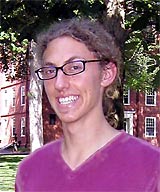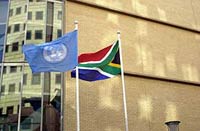|

|

|
NEWS
SEARCH
|
|
|
|

|
Dispatches from the 2002 U.N. World Summit on Sustainable
Development
Part
One: Berkeley senior Yogi Hendlin tells why he decided
to put his beliefs into action at the conference
26
August 2002
Editor's Note: Yogi Hendlin, a fourth-year political
science student at UC Berkeley, is attending the 2002
World Summit on Sustainable Development in Johannesburg,
South Africa, from August 26 to September 4. One of several
members of the Berkeley campus community at the event,
Hendlin will attend the summit as a representative of
the Adbusters Media Foundation, a not-for-profit group.
In this, the first of several dispatches Hendlin will
write from Johannesburg, he explains why he felt compelled
to participate.
JOHANNESBURG, SOUTH AFRICA — The archetypal
clash between human beings and nature has arrived at a
juncture where there will be no victor. With half of the
world's rivers polluted, 4 billion people living on less
than $2 per day and 2 billion going hungry, most of us
just want to swallow the uncomfortable reality and get
on with our lives.
| |

Berkeley
student Yogi Hendlin
|
The reality swirling around us as we continue our quotidian
everyday life seems not to affect us. After all, we didn't
create this problem, so we shouldn't have to clean it
up, right? Sure, we recycle, try to ride bikes and vote
our conscience, but when it comes down to it, we simply
don't have the time or the resources to take a day or
a few hours to plant a garden, write our congressperson
or act. And even if we did have the time, what can we
do?
In Johannesburg right now, the world's leaders are asking
the same questions. Our collective future will be debated
by 100 of the world's presidents and top leaders, alongside
Ministers of Environment from every country in the world,
who have converged at the 2002 World Summit on Sustainable
Development (also called the Earth Summit and the Rio+10,
after the first landmark summit in Rio de Janeiro in 1992).
Other attendees include more than 70,000 representatives
from non-government organizations (NGOs) and transnational
business conglomerates as well as government officials,
scientists and of course, environmentalist protesters.
| |
 |
 |
Will recycling
a can, or reusing a water bottle truly benefit the
sustainability of this planet, and the life and
health of all the beings that roam it?
|
The central issue these representatives intend to confront
is spelled out in the United Nations Environmental Program's
vision statement: "At the dawn of this new century, we
have at our disposal the human and material resources
to achieve sustainable development, not as an abstract
concept but as a concrete reality." Though achievable,
this "concrete possibility" deviates drastically from
the current world trajectory. Human "progress" is catapulting
us in the direction of increased consumption, increased
disparity in wealth, increased environmental degradation,
and catastrophes resulting from overconfidence in technology
and wild expansionism.
I decided to forgo the sweet slothfulness of summer —
and the Burning Man festival — and to instead do
everything in my power to attend this landmark event.
I feel that my participation is vital, both for transferring
the abstractions I've learned in my years of study into
reality and for the contributions (however small) I can
make to create a more just, peaceful and sustainable world.
Born green
 |
The
United Nations and South African flags fly over Johannesburg's
conference center. U.N. photo
|
My parents have always inspired me to take an assertive
role in the future of the world. Growing up in a politically
active family, environmentalism has always seemed just
a natural part of human self-preservation —
if we can't take care of our environment, we die.
I have always felt an ecological calling, believing there
is a fundamental problem with the way that business is
run on planet Earth. Yet I have always thought in abstractions
because I felt helpless to act, paralyzed to make any
decisions that could contribute to a paradigm shift.
Studying abroad in Spain and Chile last year, I began
to see a wider panorama of the world's reality —
namely, that there are 6 billion people outside the bubble
of North America. The intelligentsia in these countries
have a more global and accurate perspective, attentive
to the current world events while viewing the United States
as the world's leader, for better or worse.
| |
 |
 |
Only
through critical thinking can one begin to form
an educated opinion, and from this develop convictions.
|
Last semester I took a course on Environmental Politics
in Chile, learning about the Rio de Janeiro conference,
the largest-ever environmental gathering on climate change,
biological diversity, and the delicate relationship between
humans and nature. My teachers Carlos Martin and Emmanuelle
Barozet focused us on international environmental measures,
and in my investigations it dawned on me how apathetic
and undaunted the world powers were acting when faced
with real and chilling facts.
I was ready to drop out of school to take action. As
the sobering effects of the environmental crisis sank
in, I felt that as long as I was in school I would be
unable to make a full-time commitment to solid action
and, as I saw it, assume responsibility for the Earth
and the future of human life.
Critical thinking
But I also realized that without the foundation laid
by my academic life and intellectual curiosity, my actions
would be ignorant and perhaps hurt the very movement I
aspire to help. Deliberative thinking is basic to constructive
action. Reactionism and destruction, while taking little
effort, focus on the problem instead of the solution.
Only through critical thinking can one begin to form an
educated opinion, and from this develop convictions.
At UC Berkeley, the avant-garde atmosphere ranges from
the tradition of environmental activism dating back to
the creation of People's Park to the development of 'smart'
power strips that turn off after the user leaves the room.
Here, I have found the support of driven intellectuals
and activists — true students of the university
in the historic sense — and a place of contemplation,
dialectic, deliberation and ultimately, evolution of our
conception of truth.
Berkeley mentors such as Wendy Brown, professor of political
science and women's studies, have inspired me to challenge
my own suppositions while retaining the important clusters
of light that I have gathered from the occurrence called
life. Without the skills that I have learned from rhetoric
lecturer Felipe Gutterriez and associate professor Frederick
Dolan, I would have never been able to decode the rhetoric
of mass media and corporate culture that is so omnipresent
yet so oblique.
The Berkeley Experience
Through living at the vegetarian co-op house Lothlorien,
majoring in Political Science and Rhetoric, and working
for the student environmental activism group Calpirg,
I have had a brush with "the Berkeley Experience." You
know, the realization that this experiment called Berkeley
has shaken up my ideas and assumptions and compelled me
to re-examine my priorities and goals and work for a cause
I believe in. I have made small commitments to my beliefs
by protesting Citibank on Shattuck with fellow students,
interning for the Chilean think tank and school Facultad
Latinoamericana de Ciencias Sociales (FLACSO), and giving
leftovers to the homeless through my job at Intermezzo
Café.
Why am I attending Rio+10? Because a long time ago, I
realized that I had no choice but to dedicate myself to
continuing human life and creating a new meaning by re-establishing
the balance between an anthrocentric society and a finite
nature.
—Yogi
Hendlin
|

|